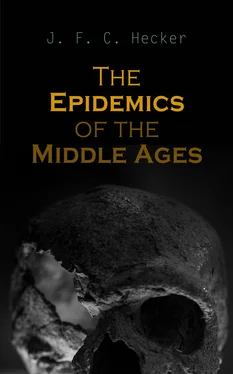Of all these notions and views regarding the plague, whose development we have represented, there are two especially, which are prominent in historical importance:—1st, The opinion of learned physicians, that the pestilence , or epidemic constitution, is the parent of various kinds of disease ; that the plague sometimes, indeed, but by no means always, originates from it: that, to speak in the language of the moderns, the pestilence bears the same relation to contagion, that a predisposing cause does to an occasional cause: and 2dly, the universal conviction of the contagious power of that disease.
Contagion gradually attracted more notice: it was thought that in it, the most powerful occasional cause might be avoided; the possibility of protecting whole cities by separation, became gradually more evident; and so horrifying was the recollection of the eventful year of the “ Great Mortality ,” that before the close of the 14th century, ere the ill effects of the Black Plague had ceased, nations endeavoured to guard against the return of this enemy, by an earnest and effectual defence.
The first regulation which was issued for this purpose, originated with Viscount Bernabo, and is dated the 17th Jan. 1374. “Every plague-patient was to be taken out of the city into the fields, there to die or to recover. Those who attended upon a plague-patient, were to remain apart for ten days, before they again associated with any body. The priests were to examine the diseased, and point out to special commissioners the persons infected; under punishment of the confiscation of their goods, and of being burned alive. Whoever imported the plague, the state condemned his goods to confiscation. Finally, none except those who were appointed for that purpose, were to attend plague-patients, under penalty of death and confiscation 189.”
These orders, in correspondence with the spirit of the 14th century, are sufficiently decided to indicate a recollection of the good effects of confinement, and of keeping at a distance those suspected of having plague. It was said that Milan itself, by a rigorous barricado of three houses in which the plague had broken out, maintained itself free from the “ Great Mortality ,” for a considerable time 190; and examples of the preservation of individual families, by means of a strict separation, were certainly very frequent. That these orders must have caused universal affliction from their uncommon severity, as we know to have been especially the case in the city of Reggio, may be easily conceived; but Bernabo did not suffer himself to be deterred from his purpose by fear—on the contrary, when the plague returned in the year 1383, he forbad the admission of people from infected places into his territories, on pain of death 191. We have now, it is true, no account how far he succeeded; yet it is to be supposed that he arrested the disease, for it had long lost the property of the Black Death, to spread abroad in the air the contagious matter which proceeded from the lungs, charged with putridity, and to taint the atmosphere of whole cities by the vast numbers of the sick. Now that it had resumed its milder form, so that it infected only by contact, it admitted being confined within individual dwellings, as easily as in modern times.
Bernabo’s example was imitated; nor was there any century more appropriate for recommending to governments strong regulations against the plague, than the 14th; for when it broke out in Italy, in the year 1399, and still demanded new victims, it was for the 16th time; without reckoning frequent visitations of measles and small-pox. In this same year, Viscount John, in milder terms than his predecessor, ordered that no stranger should be admitted from infected places, and that the city gates should be strictly guarded. Infected houses were to be ventilated for at least eight or ten days, and purified from noxious vapours by fires, and by fumigations with balsamic and aromatic substances. Straw, rags, and the like, were to be burned; and the bedsteads which had been used, set out for four days in the rain or the sunshine, so that, by means of the one or the other, the morbific vapour might be destroyed. No one was to venture to make use of clothes or beds out of infected dwellings, unless they had been previously washed and dried either at the fire or in the sun. People were, likewise, to avoid, as long as possible, occupying houses which had been frequented by plague-patients 192.
We cannot precisely perceive in these an advance towards general regulations; and perhaps people were convinced of the insurmountable impediments which opposed the separation of open inland countries, where bodies of people connected together could not be brought, even by the most obdurate severity, to renounce the habit of a profitable intercourse.
Doubtless it is nature which has done the most to banish the Oriental plague from western Europe, where the increasing cultivation of the earth, and the advancing order in civilized society, have prevented it from remaining domesticated; which it most probably was in the more ancient times.
In the 15th century, during which it broke out seventeen times in different places in Europe 193, it was of the more consequence to oppose a barrier to its entrance from Asia, Africa, and Greece (which had become Turkish); for it would have been difficult for it to maintain itself indigenously any longer. Among the southern commercial states, however, which were called on to make the greatest exertions to this end, it was principally Venice, formerly so severely attacked by the Black Plague, that put the necessary restraint upon the perilous profits of the merchant. Until towards the end of the 15th century, the very considerable intercourse with the East was free and unimpeded. Ships of commercial cities had often brought over the plague: nay, the former irruption of the “ Great Mortality ” itself had been occasioned by navigators. For, as in the latter end of Autumn, 1347, four ships full of plague-patients returned from the Levant to Genoa, the disease spread itself there with astonishing rapidity. On this account, in the following year, the Genoese forbad the entrance of suspected ships into their port. These sailed to Pisa and other cities on the coast, where already nature had made such mighty preparations for the reception of the Black Plague, and what we have already described took place in consequence 194.
In the year 1485, when, among the cities of northern Italy, Milan especially felt the scourge of the plague, a special council of health, consisting of three nobles, was established at Venice, who probably tried every thing in their power to prevent the entrance of this disease, and gradually called into activity all those regulations which have served in later times as a pattern for the other southern states of Europe. Their endeavours were, however, not crowned with complete success; on which account their powers were increased, in the year 1504, by granting them the right of life and death over those who violated the regulations 195. Bills of health were probably first introduced in the year 1527, during a fatal plague 196which visited Italy for five years (1525–30), and called forth redoubled caution.
The first lazarettos were established upon islands at some distance from the city, seemingly as early as the year 1485. Here all strangers coming from places where the existence of plague was suspected were detained. If it appeared in the city itself, the sick were despatched with their families to what was called the Old Lazaretto, were there furnished with provisions and medicines, and, when they were cured, were detained, together with all those who had had intercourse with them, still forty days longer in the New Lazaretto, situated on another island. All these regulations were every year improved, and their needful rigour was increased, so that from the year 1585 onwards, no appeal was allowed from the sentence of the Council of Health; and the other commercial nations gradually came to the support of the Venetians, by adopting corresponding regulations 197. Bills of health, however, were not general until the year 1665 198.
Читать дальше










